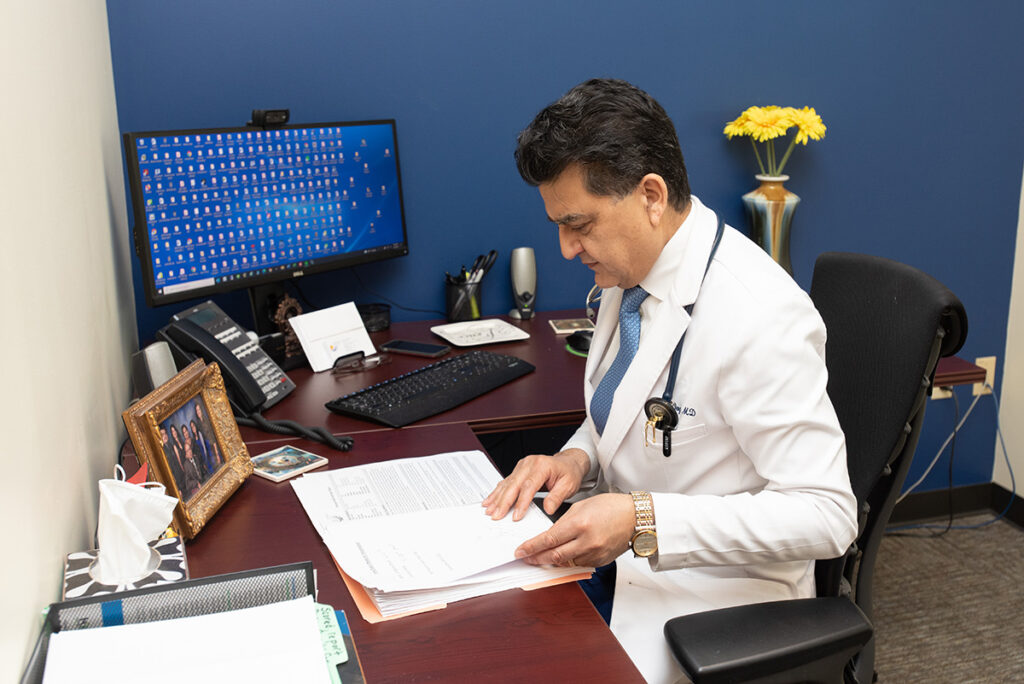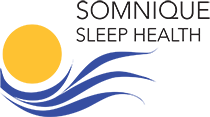What is a sleep study?
At Somnique Health, our sleep physician is Dr. Vivek Dogra.
What is a sleep study?
The purpose of a sleep study (polysomnogram) is to accurately diagnose various sleep disorders so that they can be treated effectively. Sleep studies generally take place in a sleep lab during a person’s normal sleeping period. Under the supervision of a trained sleep technician, the study records the patient’s brain waves, breathing, limb movements, oxygen level and heart rate.
Physicians trained in sleep medicine then evaluate the test results to determine a treatment plan to resolve the patient’s sleep-related issues. At Somnique Health, our sleep physician is Dr. Vivek Dogra.

Why do you need a sleep study?
Various sleep disorders are often diagnosed by doing a sleep study:
- Excessive snoring
- Sleep apnea (periods where the breath stops during sleep)
- Daytime sleepiness
- Narcolepsy (sudden onset of sleep)
- Insomnia (inability to sleep)
- Abnormal movements during sleep including kicking legs during sleep, sleepwalking, epilepsy, abnormal acting out of dreams, etc.
There may be other reasons for your physician to recommend a sleep study. Please ask your physician so you understand exactly why a sleep study is necessary.
What is recorded in a sleep study?
The term “polysomnogram” means that there will be multiple tests in a sleep study. There are various body activities and indicators that may be measured:
- Eye movements – identifies different stages of sleep and wakefulness.
- Brain activity (EEG) – monitors the brain’s electrical currents.
- Limb movement – charts the number and intensity of arm and leg movement.
- Breathing patterns – checks the number and depth of each breath.
- Heart rhythm (ECG) – charts the electrical activity of the heart.
- Oxygen saturation – shows the percentage of oxygen in the blood.
- Sleep latency – tells how much time it takes to fall asleep.
- Sleep duration – shows how long a person stays asleep
- Sleep efficiency – summarizes sleep, taking the whole night into account
Are there any risks with the procedure?
There are no known risks for a sleep study other than occasional minor skin irritation where the adhesive is used for the monitoring electrodes.
Before the study
- We recommend that you see our sleep physician. He will explain the procedure to you and answer all your questions.
- You will be asked to complete a sleep questionnaire or sleep diary before you participate in the study.
- Be sure to tell our physician about all your medications, prescription and over-the-counter, as well as all herbal supplements that you are taking, as they may affect the test results.
On the day of the study
- You may be asked not to take any naps if possible.
- Avoid alcohol and caffeine-containing products before the testing.
- Sedatives may not be allowed during the sleep study, unless prescribed by the sleep physician or your primary care physician before the study.
- You may shower and shampoo before going to the sleep lab. However, please don’t put any lotion or oil on your skin because the electrodes may not stick to the skin properly.
- Please remove all nail polish.
- You may bring your own pajamas and pillow.
- If needed, you may be able to shower and dress for work the morning after the sleep study.
- If you have any other special needs. please contact the lab 48 hours in advance.
During the study
- When you arrive for the study, a friendly sleep technologist will greet you, guide you to your room and allow you to get comfortable.
- You may also be given some paperwork to fill out while you relax in the room.
- You can bring a book to read; you can also watch the TV in your room. Free wi-fi is also available.
- When it is time to begin the monitoring, you will be asked to change into pajamas or sleep wear.
- You will be asked to remove any jewelry or other objects that may interfere with the equipment.
- Small metal discs, or electrodes, will be positioned on your head and body to measure brain activity, heart rhythm , eye movements and leg movements.
- Sensors will be applied to measure your oxygen level and another special sensor will monitor airflow from your nose.
- The temperature of the room may need to be maintained at a certain level, but we provide blankets if you need them.
- Lights will be turned off and monitoring will begin before you fall asleep.
- For some patients who have sleep apnea, the sleep study will evaluate the effects of continuous positive airway pressure (CPAP.) During the CPAP study, a mask is fitted around the nose and pressurized air is used to keep the airway open during sleep. The pressure level that holds the airway open during sleep and allows the patient to get a good night’s sleep is the prescribed CPAP pressure.
After the study
- When the study has been completed, the electrodes and other devices will be removed.
- For multiple sleep latency testing (MSLT,) five short daytime nap periods will be assigned at specific intervals on the day following the previous night’s sleep study.
- For multiple wake testing (MWT,) you will be asked to try and stay awake for certain periods of time during the next day.
- On certain occasions, you may be required to follow-up in the sleep clinic the day after your test.
- The data is scored and then interpreted by our sleep specialist, Dr. Vivek Dogra.
- The results and the treatment plan is then reviewed with you and also sent to your primary care physician.
- If you are a sleep apnea patient and are a candidate for CPAP therapy, you will be scheduled to pick up the CPAP machine along with the mask and other supplies. During that visit you will also be educated on how to use and maintain the machine on a regular basis.
